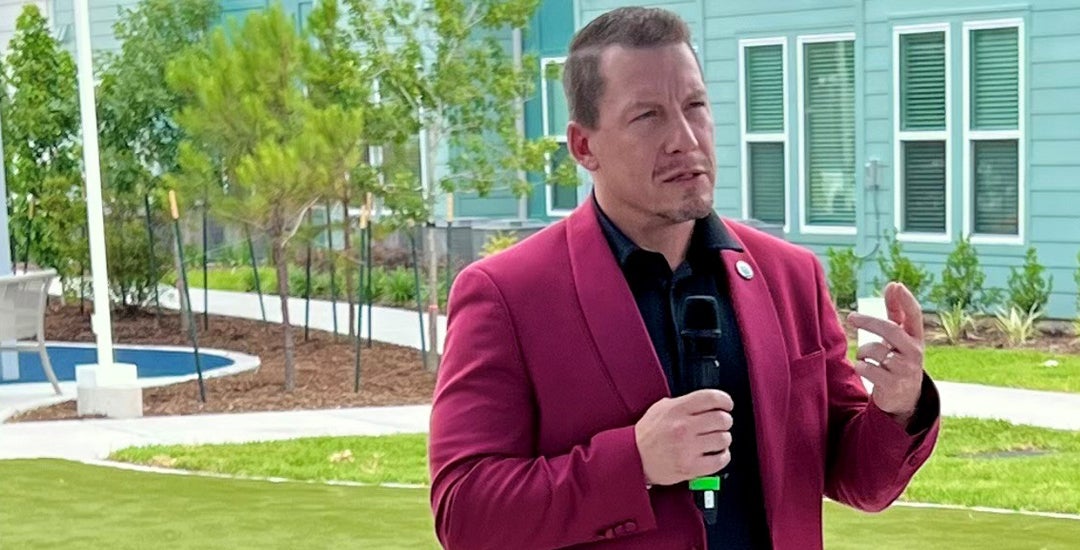Within the city limits, the Houston Housing Authority is one of the key government agencies tasked with providing affordable housing. The organization, established in 1938, serves over 100,000 low-income individuals through the Housing Choice Voucher Program, public housing and tax credit developments, project-based voucher developments and other affordable housing options like mixed-income and workforce housing.
On Feb. 10, the agency began a new chapter when Jamie Bryant began his tenure as its president and CEO. Armed with nearly 25 years of real estate experience, Bryant pledged to foster “an environment of integrity, transparency and respect” after his appointment to the role.
The Urban Edge spoke with Bryant as he entered his fourth month leading the Houston Housing Authority, a research partner with the Kinder Institute. The interview has been edited for length and clarity.
What are the biggest challenges for affordable housing, and how is the Houston Housing Authority equipped to meet them?
Bryant: The challenges we’re facing are on multiple fronts. The answer around affordable housing is related to a lot of general housing issues: the cost of construction, high interest rates and insurance rates spiking significantly. To figure out how to build housing for those at the lower income levels, the gaps have become bigger.
But a lot of the challenges are the unknown. The president’s budget proposal for 2026 proposes cuts to HUD (the Department of Housing and Urban Development) that are over 40% and transferring quite a bit of services that HUD provides onto the states. As of now, states don’t have agencies set up to manage that. We can lobby and make our voices heard. But regardless of what happens in the macro environment that we don’t have much control over, we can be adaptive and figure out the best ways to make the most progress given the constraints that may be thrown at us.
What advantages does Houston have?
Bryant: One of the big issues around housing costs in general, whether it’s affordable or not, is timing and regulation and things of that nature. Fortunately, Houston is not a city that is heavy with zoning and entitlements, and things can move and get built faster. Houston has been through natural disasters, yet we’ve been able to bounce back much quicker than a lot of places because we don’t throw the road blocks up necessarily. Houston has become less flexible over the years, but by comparison to other places, even in Texas, were still much more flexible, business friendly and permit friendly.
That doesn’t mean we’re perfect. But culturally, our city bands together and it’s much more about hard work and collaboration than a lot of other places.
On the flip side, what’s holding us back?
Bryant: The advantages and the disadvantages cut both ways. The disadvantage is that people want to come here. Any time you’re on the map as a great place to live where the cost of living is low and the jobs are abundant, you are going to have an influx of people. That’s going to exacerbate our problem on housing and affordability.
Given the national trend away from housing projects and toward more of a public-private model, what are the challenges and opportunities that poses?
Bryant: I believe the Housing Choice Voucher Program has been probably one of the most effective tools that HUD has put out there. From a housing authority standpoint, we have to be more effective in how we manage the program. One of the complaints we’ve heard is somebody with a voucher wants to lease a unit, and the apartment is willing to lease to them, (but) before they can move into that apartment there has to be an inspection. Sometimes that could take three to four weeks. During that time, the landlord has to decide if they’re going to hold a unit for a voucher recipient waiting for the inspection from the housing authority. We want to fast-track that process. Can we get out there within seven to 15 days, instead of 21 to 28, and make those things easier and make it more advantageous?
We've written about the shortage of housing supply for low-income households. It's also expensive to build new housing without subsidies. What opportunities do you see in terms of unlocking more supply?
Bryant: Supply is a holistic formula, and we need to think about it more holistically. It’s not just about affordability. One of the things we’re working with the city and the county on is a bigger-picture housing plan for the Greater Houston region. That includes middle-income families as well as low-income. If we’re getting enough good-quality housing that (is) affordable for middle-class families, that will ultimately help the lower-class families as well. But when supply is limited, and the supply that is coming on is generally at the upper end, that is not helping find balance in that supply-and-demand curve and the pricing points.
To unlock new housing, there are a lot of options from an incentive standpoint. I spent a lot of time doing public-private partnerships in my private career. They still need to be managed well, but I love the increment financing argument. We can incentivize developers to add much-needed supply while putting the onus on them. Developers only get the money back if they actually create the increment and the value that they promise to. We, as the government, are paying them back through incentives, but those incentives are tied to performance. They’re not tied to budgets that exist today, because it’s all new construction.
What are some new state and local policies that could help?
Bryant: The only way we’re going to get anything done is through partnerships with private developers. They’re still going to be doing the majority of the work when it comes to housing, and so we have to continue to find ways to incentivize private developers to want to be a part of the solution. It is a balancing act. The policies need to be there to allow that to happen. I’ve heard developers say that if they could get through permitting faster, then they would be happy to work with the government on affordable housing initiatives. There has to be a source of money, and it has to be sustainable. When you're talking about private developers, they need to know that they can still earn a risk-adjusted market return for their time and money that they’re going to put into it. Otherwise, they're not motivated to participate. They’re not philanthropists.
Locally, and state-wise here, we’re working on some policy initiatives where we’re trying to build some consensus. Right now, there’s a lot of “check the box” policies. In the city of Houston, one of them is this idea of high opportunity areas. The city of Houston passed a deal that says anything that's going to go to council can't be in an area that has a poverty rate above 25%. There’s been this longstanding argument about concentration of poverty, and not wanting to just keep building affordable housing in places that are already full of low-income residents. However, there's a lot of areas that are transitioning. Gentrification is happening so fast that if we don’t act now, we may never preserve affordability in some areas.
What is the role of research?
Bryant: Research really helps housing agencies understand the nuance of some of these situations, like the fact that there might be cultural barriers when moving people to high opportunity areas. It might seem good on paper, but someone might say, “I don’t want to move out of my heavily Hispanic neighborhood, because that’s where my family, church and grocery store are. I don’t want to move out to Katy just because it’s a high opportunity area.”
What ends up happening is a lot of times these dollars get spent, but then there’s no real outcomes. “We got a $2 million grant. We've worked on it for four years, and we blew through it, and we got 10 families moved into high opportunity areas.” Well, that’s not a very good investment at the end of the day. Data plays a big part of that as well. What helps me out is being able to articulate data to people and show them what can be accomplished.




